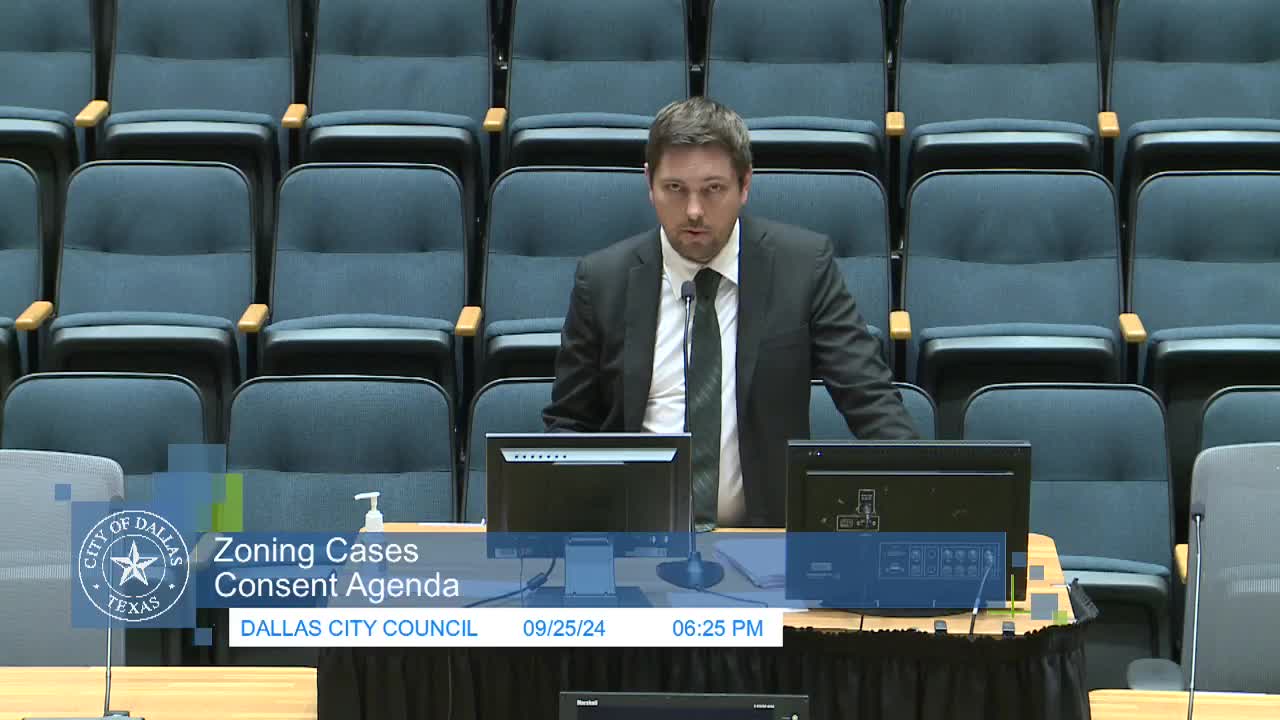City Council Faces Controversy Over Zoning Variance Requests
September 25, 2024 | Dallas, Dallas County, Texas
This article was created by AI summarizing key points discussed. AI makes mistakes, so for full details and context, please refer to the video of the full meeting. Please report any errors so we can fix them. Report an error »

During a recent city council meeting, discussions centered around zoning changes and specific use permits, highlighting the ongoing challenges faced by small businesses and community development initiatives.
One significant topic was the request for a 10-year renewal period for a specific use permit (SUP) by a local small business, which aims to modernize its operations. The business owner emphasized the need for this extension to secure investments and mitigate risks associated with reapplying for permits in the future. The council acknowledged the importance of supporting small businesses, particularly those that have been part of the community for years.
The council also addressed several zoning consent agenda items, with items Z4 and Z6 being notably discussed. Item Z4, which involved a planned development district for townhouse and limited office uses, received mixed feedback from local property owners, with two in favor and six opposed. The council ultimately approved the zoning changes with specific conditions regarding sidewalk requirements.
Item Z6, concerning a truck stop development, also sparked debate. The mayor pro tem advocated for a 10-year period for the project, citing the applicant's need for financial stability to secure a $3 million investment. The council unanimously supported this motion, recognizing the economic implications of the development.
Another critical discussion involved a public hearing regarding low-income housing tax credits for a project by DHA Housing Solutions. Although there were no registered speakers, council members expressed the need for community engagement before making a decision. A motion was made to hold the item under advisement until the next meeting, allowing for further community input.
The meeting also included a contentious debate over a variance request for a restaurant seeking to serve alcohol near a church. While some council members argued for the business's right to operate and the potential economic benefits, others emphasized the importance of adhering to spacing regulations and respecting community sentiments, particularly from the church. Ultimately, a motion to deny the request was supported by several council members, reflecting a commitment to uphold existing policies and community standards.
Overall, the meeting underscored the delicate balance between fostering local business growth and addressing community concerns, with council members navigating complex zoning regulations and public sentiment in their decision-making processes.
One significant topic was the request for a 10-year renewal period for a specific use permit (SUP) by a local small business, which aims to modernize its operations. The business owner emphasized the need for this extension to secure investments and mitigate risks associated with reapplying for permits in the future. The council acknowledged the importance of supporting small businesses, particularly those that have been part of the community for years.
The council also addressed several zoning consent agenda items, with items Z4 and Z6 being notably discussed. Item Z4, which involved a planned development district for townhouse and limited office uses, received mixed feedback from local property owners, with two in favor and six opposed. The council ultimately approved the zoning changes with specific conditions regarding sidewalk requirements.
Item Z6, concerning a truck stop development, also sparked debate. The mayor pro tem advocated for a 10-year period for the project, citing the applicant's need for financial stability to secure a $3 million investment. The council unanimously supported this motion, recognizing the economic implications of the development.
Another critical discussion involved a public hearing regarding low-income housing tax credits for a project by DHA Housing Solutions. Although there were no registered speakers, council members expressed the need for community engagement before making a decision. A motion was made to hold the item under advisement until the next meeting, allowing for further community input.
The meeting also included a contentious debate over a variance request for a restaurant seeking to serve alcohol near a church. While some council members argued for the business's right to operate and the potential economic benefits, others emphasized the importance of adhering to spacing regulations and respecting community sentiments, particularly from the church. Ultimately, a motion to deny the request was supported by several council members, reflecting a commitment to uphold existing policies and community standards.
Overall, the meeting underscored the delicate balance between fostering local business growth and addressing community concerns, with council members navigating complex zoning regulations and public sentiment in their decision-making processes.
View full meeting
This article is based on a recent meeting—watch the full video and explore the complete transcript for deeper insights into the discussion.
View full meeting
